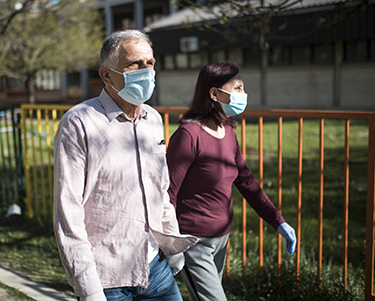There are so many mysteries surrounding long COVID-19: Why do some people get it while others don’t? Why does it attack certain body systems and not others? How can it be cured?
Clinicians and researchers are learning which medications and supplements can help manage long COVID symptoms. In Tuesday’s session “The Impact of COVID-19 on Other Health Conditions,” presenters gave an overview of long COVID, outlining an extensive list of symptoms in various areas of the body: weakness, fatigue, brain fog, brain and lung complications, heart problems, gastrointestinal issues, kidney pain, shaking hands, rashes, swelling in legs and feet, muscle aches, changes in vision, eye redness, hearing loss, distorted sense of smell and taste, neck pain and swelling of the thyroid.
 Long COVID typically presents four weeks after the initial infection, said Hossam Ashour, associate professor in the department of integrative biology at the University of South Florida in Tampa.
Long COVID typically presents four weeks after the initial infection, said Hossam Ashour, associate professor in the department of integrative biology at the University of South Florida in Tampa.
“We don’t understand the full extent of what causes (long COVID), why it happens in some individuals and not in others,” Ashour said. “Some people are still reporting problems of smell and taste, up to this day, which is very unique to this virus. There’s more to COVID that we need to understand.”
Hatem Elshabrawy, assistant professor at the College of Osteopathic Medicine at Sam Houston State University in Texas, provided some background: There are seven human coronaviruses. Only three have caused severe disease: the respiratory illnesses COVID-19, SARS and MERS. SARS-CoV-2 is the virus that causes COVID-19. The original SARS-CoV was first reported in 2003 and caused the illness known as SARS (severe acute respiratory syndrome). MERS (Middle East respiratory syndrome) was first reported in Saudi Arabia in 2012.
Although SARS-CoV-2 shares 80% of its sequence identity with the original SARS-CoV and 50% with MERS, COVID-19 can act differently, becoming more than a respiratory illness.
“The thing is we don’t really know what this virus means in terms of complications and severity….What is so special about it?” Elshabrawy asked. “The sequence identity is very high when compared to SARS-CoV, so why are we having all these complications that are very specific to SARS-CoV-2?”
Elshabrawy, who was trained as a pharmacist, shared some of the medications that have been shown to manage long COVID in patients. These include:
- Antibiotics such as azithromycin
- Antiviral compounds such as remdesivir and favipiravir
- Antibodies such as Infliximab and Tocilizumab
- Antidepressants
- Antihistamines that include H1 blockers
There are also supplements that have been shown to help, he said. These include multivitamins, Panax ginseng plant extract, omega-3 fatty acids and Coenzyme Q10.
Managing long COVID in children
Matthew Spears, a second-year osteopathic medical student at Sam Houston State University, presented on potential long COVID management strategies in children and adolescents — which differ from those in adults.
Spears and his fellow med students did a literature search on children and long COVID. They reviewed 35 studies to support their study.
The students learned that children infected with acute COVID are often asymptomatic. Therefore, when they present with long COVID symptoms, the illness might not be suspected because it was unknown that they ever had COVID. The severity of the initial COVID infection has shown little to no correlation with the severity of long COVID, Spears said.
The most common long COVID symptoms in children are fatigue, difficulty breathing and brain fog. There are a few symptoms that tend to combine together, such as fatigue and difficulty concentrating. Another combo is shortness of breath and muscle aches. These combinations of symptoms can have significant limitations on children being able to participate fully in school. In addition, the combination of shortness of breath and muscle aches meant those children were not very active and that tended to worsen long COVID symptoms, Spears said.
In one study, nearly all kids reported some sort of daily limitation. While 50% were able to attend school, about 36% had severe limitations, meaning they were unable to go to school or were severely limited at school.
The medications used to manage long COVID in adults are either not approved in children or the side effects in children outweigh the benefits, Spears said.
“It really leaves us with just supplementation of vitamins and minerals to manage this syndrome,” he said.
Vitamin C, magnesium and selenium were shown to be effective in reducing the fatigue and brain fog. In addition, vitamins C, D and E and magnesium and selenium have anti-inflammatory effects, and some studies showed they improved thyroid function, which can lessen some of the symptoms children experience, he said.
Photo by Vlada_maestro, courtesy iStockphoto.